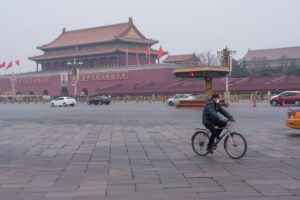Happiness levels on social media decline during periods of high air pollution, according to a groundbreaking study from MIT.
In a paper published earlier this week in the journal Nature Human Behaviour, researchers applied an algorithm that measured the sentiment of 210 million geotagged tweets from China’s largest social media platform, Sina Weibo.
They then calculated the median value for that city and day based on a happiness index, ranging from 0 to 100, with 0 indicating a very negative mood, and 100 a very positive one, which revealed that higher levels of pollution are associated with a decrease in people’s happiness levels.
Research has previously shown that air pollution is damaging to health, cognitive performance, productivity, and educational outcomes but lead researcher Siqi Zheng says the study now shows that air pollution has a broader impact on people’s social lives and behaviour.
‘Pollution also has an emotional cost,’ Zheng says. ‘People are unhappy, and that means they may make irrational decisions.’
‘On polluted days, people have been shown to be more likely to engage in impulsive and risky behaviour that they may later regret, possibly as a result of short-term depression and anxiety caused by air pollution,’ according to Zheng.
Typically, happiness levels have been measured using questionnaires. However, these surveys only provide a single snapshot and responses tend to reflect their overall feeling of well-being, rather than their happiness on particular days or times.
‘Social media gives a real-time measure of people’s happiness levels and also provides a huge amount of data, across a lot of different cities,’ Zheng says.
The research also revealed that women were more sensitive to higher pollution levels than men, as were those on higher incomes.
Shanjun Li, a professor of environmental economics at Cornell University, who was not involved in the research, said: ‘Through a creative use of social media data, the authors convincingly demonstrate a strong relationship between air quality and expressed happiness, a subjective measure of well-being.’
‘The study adds to the growing scientific knowledge on the social cost of air pollution by focusing on the cost borne by the ‘silent majority’ who do not typically show up in the studies based on morbidity and mortality outcomes,’ Li says.
The research team was led by Siqi Zheng, the Samuel Tak Lee Associate Professor in MIT’s Department of Urban Studies and Planning and Center for Real Estate, and the Faculty Director of MIT China Future City Lab. It also includes research from Jianghao Wang of the Chinese Academy of Sciences, Matthew Kahn of the University of Southern California, Cong Sun of the Shanghai University of Finance and Economics, and Xiaonan Zhang of Tsinghua University in Beijing.
















